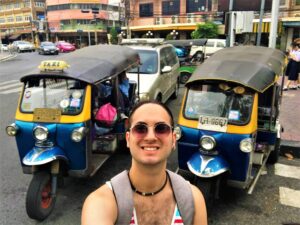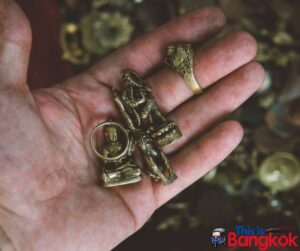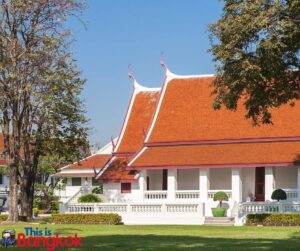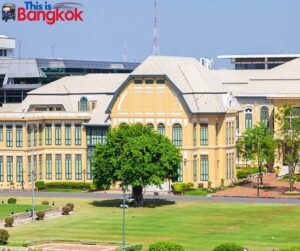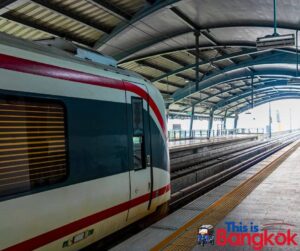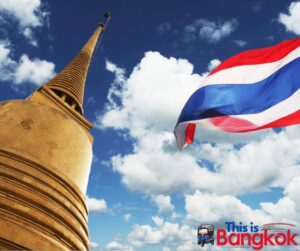Bangkok, famous for its vibrant street life and cultural landmarks, is a bustling metropolis attracting millions of travelers yearly. Its airports serve as the primary gateways into this fascinating city.
However, as with any international travel, navigating through customs can be intimidating for first-time visitors.
This guide aims to shed light on the customs procedures at Bangkok airports, ensuring a smoother and more comfortable journey for all travelers.
Here you will find Some general information about customs procedures at Bangkok’s Suvarnabhumi Airport (BKK) and Don Mueang Airport (DMK), the leading international airports in Bangkok, Thailand.
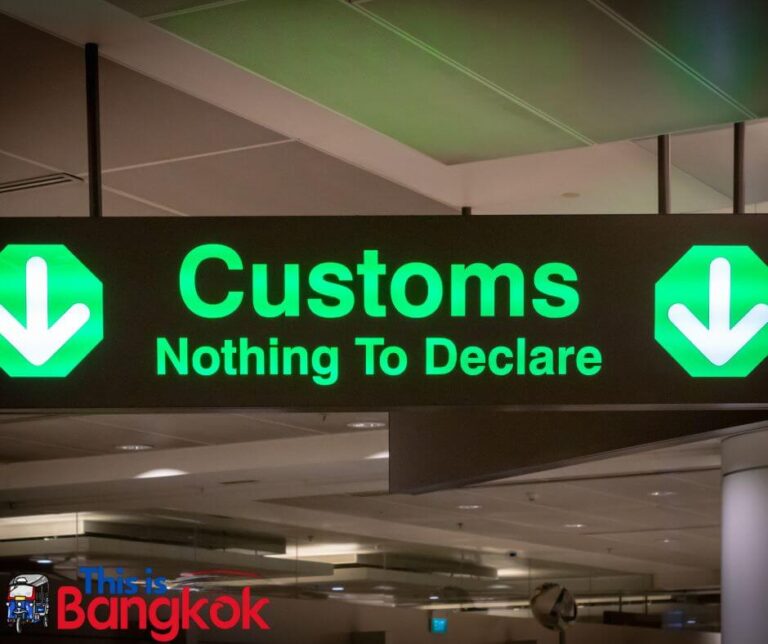
What happens when you arrive at Bangkok airport?
Arrival Procedures:
When you arrive in Bangkok, you must go through immigration, where your passport will be checked and stamped. Make sure you have a valid visa if required for your nationality.
After clearing immigration, you will collect your checked luggage from the baggage claim area.
Proceed to the customs area.
Customs Declarations:
Generally, passengers must fill out a customs declaration form, usually handed out on the flight or available at the airport.
This form asks for information about items you bring into the country, including their approximate value.
Customs Regulations:
Thailand has strict regulations regarding importing and exporting certain items, such as drugs, weapons, and counterfeit goods.
It’s essential to familiarize yourself with these regulations to avoid legal issues.
There are limits on the amount of duty-free items you can bring into the country, including alcohol and tobacco products. Exceeding these limits might result in taxation.
Green and Red Channels:
At the customs area, you will find two separate channels: the green channel and the red channel.
You can use the green channel if you have nothing to declare or are within the duty-free limits.
You should use the red channel if you have items to declare or are unsure about the regulations.
Random Checks:
Even if you use the green channel, customs officers may still conduct random checks on passengers and their luggage.
It’s essential, to be honest on your customs declaration form to avoid penalties.
Prohibited and Restricted Items:
Certain items, such as narcotics, counterfeit goods, and religious artifacts, are prohibited from being brought into Thailand.
It’s essential to familiarize yourself with the list of prohibited items to avoid legal issues.
Currency Declaration:
If you are carrying more than the equivalent of 20,000 USD in cash or foreign currency, you are required to declare it upon arrival in Thailand.
Agricultural Restrictions:
There are also restrictions on bringing particular food and agricultural products into Thailand to prevent spreading of diseases.
Please note that customs procedures and regulations can change over time, so it’s crucial to check the official website of the Thai Customs Department or the airport authority for the most current information before your travel.
Additionally, follow any instructions given by airport officials and customs officers to ensure a smooth and hassle-free entry into Thailand.
The laws relating to goods and currency taken in or out of Thailand
Goods:
Thailand has regulations to control the import and export of certain goods, focusing on protecting public health, culture, and the environment. Some key points to consider:
- Prohibited Items: Certain items are prohibited from being imported into or exported from Thailand. These include narcotics, counterfeit goods, pirated goods, obscene materials, and items that infringe on intellectual property rights.
- Restricted Items: Some items are restricted and require special permits or licenses to bring in or take out of Thailand. These items include firearms, ammunition, antiques, cultural artifacts, buddhas, wildlife products, and certain types of plants.
- Duty-Free Allowances: Thailand limits the amount of duty-free goods you can bring into the country. You may be subject to customs duties and taxes if you exceed these limits. These limits can vary based on the type of goods and the purpose of your visit (tourism, business, etc.).
Currency:
Thailand also has regulations regarding the import and export of currency and monetary instruments:
- Currency Declaration: If you are carrying an amount of cash, traveler’s checks, or other monetary instruments equivalent to or exceeding 20,000 USD (or its equivalent in other currencies), you are required to declare it to the customs authorities upon arrival in Thailand. This declaration applies whether you are entering or leaving the country.
- Documentation: It’s advisable to keep proper documentation for the currency you are carrying, such as bank statements, withdrawal receipts, or other evidence of the source of the funds. Customs officials may request this documentation.
- Currency Exchange: These services are widely available in Thailand’s airports, hotels, and banks. It’s generally recommended to exchange currency at these official outlets rather than through unofficial channels.
- Foreign Currency Export: There are no specific limits on taking foreign currency from Thailand. However, you should know any regulations in your home country that might require you to declare large amounts of currency upon arrival.
It’s important to note that customs regulations and enforcement can vary.
To ensure a smooth experience when entering or leaving Thailand, it’s advisable to check the official website of the Thai Customs Department or contact them directly for the most up-to-date information before your trip.
Additionally, be sure to follow any instructions given by customs officers to avoid any legal issues or delays during your travels.
What do I declare at customs in Thailand?
When going through customs in Thailand, you should declare personal belongings of a reasonable quantity, valued at no more than 20,000 baht collectively, provided they are not prohibited, restricted goods or food items.
Additionally, you’re allowed a maximum of 200 cigarettes or 250g of tobacco, 250g of tobacco products combined, and no more than 1 liter of alcoholic beverages.
Any excess amounts of cigarettes, tobacco, or alcohol beyond these limits should be deposited into the designated customs box, as failure to do so might lead to legal action.
How long does it take to get through customs at Bangkok Airport?
The time it takes to get through customs at Bangkok Airport depends on several factors, such as the number of passengers, the length of queues, and staff availability.
I am, generally speaking. However, you can expect to spend around 15-30 minutes in the customs area at Bangkok Airport.
This process can take longer if your paperwork has delays or issues.
It is therefore recommended to arrive at the airport in plenty of time for your departure and ensure that you have all necessary documentation ready before going through customs.
What can you not bring into Bangkok?
Pornographic Materials:
Importing or possessing pornographic materials, including explicit magazines, videos, or images, is prohibited in Thailand. Offenders can face legal consequences, including fines and imprisonment.
Counterfeit Trademark Goods and IPR Infringing Goods:
Bringing counterfeit trademark goods or items that infringe on intellectual property rights into Thailand is against the law. These include counterfeit brand-name products, fake luxury items, and unauthorized reproductions of copyrighted materials.
Fake Notes / Coins:
Bringing counterfeit currency, fake notes, and coins into Thailand is illegal and can have serious legal consequences.
Reserved Animals:
Bringing reserved animals or species listed under the Convention on International Trade in Endangered Species of Wild Fauna and Flora (CITES) into Thailand without proper permits is prohibited. This applies to endangered and protected species and their products.
Buddha Image & Antique:
Exporting specific Buddha images, artifacts, objects, and antiques from Thailand requires permission from the Fine Arts Department.
The unauthorized export of culturally significant items is prohibited.
Guns, Bullets, Explosives & Equivalents:
Importing firearms, ammunition, explosives, and related items into Thailand without proper authorization is prohibited. These items require licenses and approvals from Thai authorities.
Plants and Their Parts:
Bringing certain plants, plant products, seeds, and plant-based products into Thailand is restricted to prevent spreading of diseases and pests.
Some plants may require permits and inspections.
Living Animals and Carcasses:
Bringing living animals or animal carcasses into Thailand may require permits from the Department of Livestock Development. This helps prevent the spread of diseases.
Food, Medicine, Cosmetics, and Food Supplements:
Some food, medicine, cosmetics, and food supplements may be restricted in Thailand due to safety concerns.
It’s essential to check the Thai Food and Drug Administration (FDA) regulations and guidelines.
Vehicle Parts:
Importing certain vehicle parts and accessories may require compliance with safety and environmental standards. It’s advisable to verify regulations before importing.
Cigarettes, Tobacco, and Alcoholic Beverages:
Travelers can bring limited cigarettes, tobacco, and alcoholic beverages into Thailand, subject to specific duty-free allowances.
Exceeding these allowances may result in taxation or other penalties.
Communication Radio Devices and Telecommunications Equipment:
Bringing communication devices and telecommunications equipment into Thailand, such as satellite phones and specific radio devices, may require permits and approvals from relevant authorities.
It’s essential to research and understand the regulations and requirements for each category of items before traveling to Thailand.
Regulations can change, and non-compliance can result in legal consequences.
Always check with official sources such as the Thai Customs Department, relevant government agencies, or legal experts to ensure you know the latest rules and requirements.
In conclusion
Understanding and adhering to Thailand’s customs regulations can significantly enhance your travel experience’s ease.
From knowing what items to declare to be aware of certain goods’ restrictions, being well-informed is critical.
Remember that regulations can change, so you must check with the official Thai Customs Department or other relevant authorities before your trip.
Whether you’re visiting for tourism, business, or any other purpose, observing these guidelines will ensure your journey to the Land of Smiles is smooth and hassle-free.
Safe travels!

